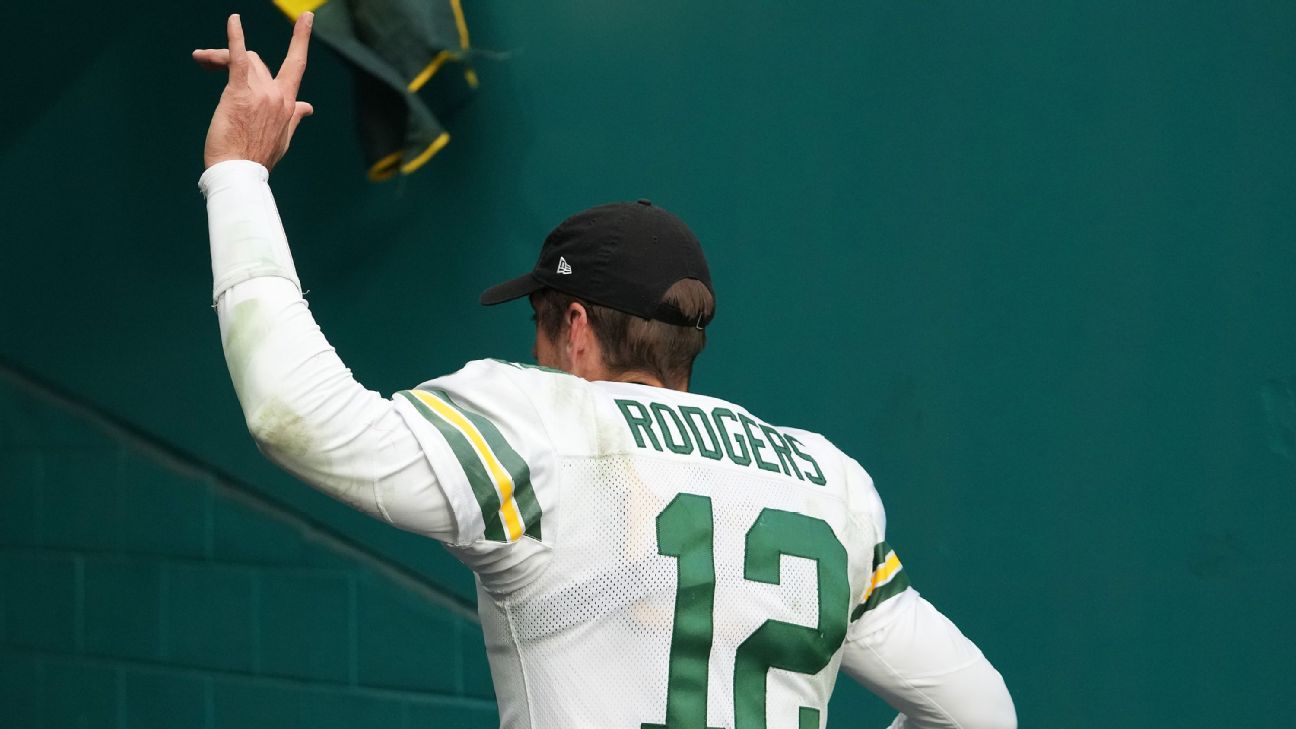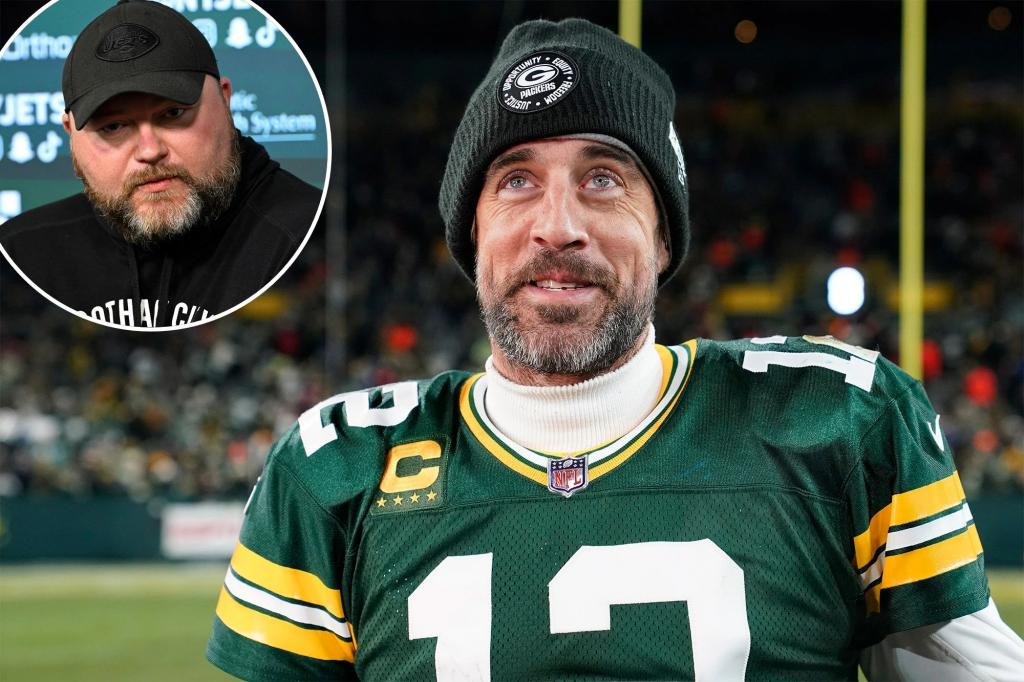
Sources: Packers trade Rodgers to Jets for picks
The Jets are acquiring quarterback Aaron Rodgers from the Packers for multiple draft picks, including a swap of first-round picks this year.
- Rich Cimini
- Rob Demovsky
For the second time in 15 years, the Green Bay Packers are trading an aging icon to the New York Jets.
The Packers agreed Monday to deal quarterback Aaron Rodgers and their 2023 first round pick (No. 15) and a 2023 fifth-round pick (No. 170) to the Jets for New York's 2023 first-round pick (No. 13), a 2023 second round pick (No. 42), a 2023 sixth-round pick (No. 207) and a conditional 2024 second-round pick that becomes a first if Rodgers plays 65% of the plays this season, sources told ESPN's Adam Schefter on Monday.
Although Hall of Fame quarterback and Jets franchise icon Joe Namath gave Rodgers his blessing to wear No. 12, the new Jets quarterback is expected to wear No. 8 -- the number he wore in college at Cal -- a source told Schefter.
Packers general manager Brian Gutekunst was hesitant to comment on the deal in much detail Monday, but -- during his previously scheduled annual pre-draft news conference, which began shortly after news of the trade terms broke -- he said there were still a few final details to be worked out. Among them likely is the fact that Rodgers still must take his physical.
Gutekunst said it was important to him for this deal to get done before the draft.
"It wouldn't have been the end of the world," Gutekunst said. "But at the same time, I think it would have certainly changed things quite a bit. So, getting it done was important. I just think certainly the capital for this year was very important, certainly more valuable than future stuff, for our football team. So, there were a number of reasons, but that's why."
The blockbuster comes 40 days after Rodgers announced on "The Pat McAfee Show" that his "intention" was to play for the Jets in 2023, triggering intermittent negotiations between the Jets and Packers that dominated the NFL headlines.
The two sides talked for weeks before talks broke down, then discussions heated up again late last week. Finally, Jets general manager Joe Douglas and Gutekunst were able to bridge their differences and come to an agreement.
With Rodgers now traded to New York, the Jets are expected to become prime-time darlings when the NFL schedule is released next month and could play up to six prime-time games, sources told Schefter. They had one last year, a Thursday night home game against the Jacksonville Jaguars.
After the trade, the Jets' odds at Caesars Sportsbook to win the Super Bowl are 14-1, while the Packers' are 50-1. The Jets' odds to make the playoffs are at -150, while the Packers' are at +170. Rodgers' odds to be named the NFL's MVP are at 18-1, the seventh-shortest among all players.
For the Jets, frustrated by years of losing and inferior quarterback play, it's arguably the biggest trade in their history, reminiscent of the Brett Favre swap with the Packers in 2008.
Not satisfied with Zach Wilson, drafted at No. 2 in 2021, Douglas is taking a big swing as he and coach Robert Saleh enter a potential make-or-break year. The Jets haven't made the playoffs in 12 years, the longest active drought in the country's four major sports leagues.
For the Packers, it marks the end of an era. Rodgers, 39, a four-time NFL MVP, led them to 11 playoff appearances and one Super Bowl championship in 15 years as the starting quarterback. Unlike Favre, who wanted to return to the Packers after he unretired, Rodgers apparently wanted out even after he said last summer that he would "definitely" finish his career with the Packers.
Things got somewhat contentious between Rodgers and the Packers this offseason. Rodgers said when he left Green Bay to start his offseason, he was under the impression that he would be welcomed back. But he said when he emerged from his darkness retreat in late February that he got the sense that something had changed.
For the Packers, what changed was their inability to speak with Rodgers. Despite Rodgers saying he would have preferred direct communication with the team, Gutekunst said the quarterback would not return what he called "many" attempts to reach him this offseason.
The Packers are now expected to turn to Jordan Love, the 2020 first-round pick who spent the previous three seasons as a backup, although they almost certainly will have to add another quarterback or two. It was Gutekunst's controversial decision to draft Love that ultimately set the wheels in motion for Rodgers' departure.
The trade ends weeks of speculation about Rodgers' future, which has become an offseason tradition. In February, he spent four days in a darkness retreat -- a period of self-isolation during which he hoped to find clarity. Retirement was one of the options, he said in a recent interview.
Several members of the Jets' organization, including Douglas, Saleh and owner Woody Johnson, flew to Southern California on March 7 on Johnson's private jet to meet with Rodgers in an attempt to persuade him to accept a trade. By then, they had received permission from the Packers to speak with him. The Jets had been targeting him since January, never wavering even though they showed interest in free agent Derek Carr.
When the Jets received a verbal commitment from Rodgers, the reaction "in the building was pretty high and everybody was pretty excited about having a player of that caliber," Johnson said.
Only a year ago, Rodgers seemed destined to finish his career in Green Bay. After contemplating retirement following the 2021 season, he signed a three-year, $150 million contract extension in March 2022.
Instead, the Jets will inherit the remainder of his contract, which includes $59.465 million guaranteed in salary and bonus this season. Most of it is made up of a $58.3 million bonus that is due no later than Week 1 of this season.


